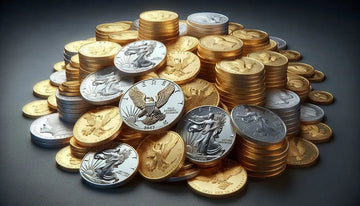Investing in precious metals, such as coins and bullion, offers a range of compelling advantages that can enhance your investment portfolio. These tangible assets provide a hedge against inflation, offer potential for appreciation, ensure liquidity, enable portfolio diversification, hold historical significance, and even provide tax advantages. In this article, we will explore each of these benefits in detail, allowing you to make informed decisions about incorporating coins and bullion into your investment strategy.
Tangible Asset: Security in Physical Ownership
Coins and bullion hold a unique advantage as tangible assets that you can physically own. Unlike intangible investments like stocks or bonds, owning physical precious metals provides a sense of security and control. The ability to hold and store these assets personally adds a layer of confidence, knowing they are not subject to the whims of the financial system or digital vulnerabilities.
Hedge Against Inflation: Preserving Purchasing Power
Investing in coins and bullion serves as a potent hedge against inflation. As fiat currencies fluctuate and lose purchasing power over time, the intrinsic value of precious metals tends to remain stable or even appreciate. The limited supply and universal demand for metals like gold and silver act as a safeguard against the erosion of your wealth caused by inflationary pressures.
Potential for Appreciation: Capitalizing on Market Trends
Coins and bullion have the potential for long-term appreciation, making them attractive investment vehicles. As global demand for precious metals rises, driven by industrial uses, jewelry, and investment purposes, their prices may experience significant growth. Additionally, rare coins or limited-edition pieces can appreciate in value due to their historical significance, rarity, and collector demand.
Liquidity: Easily Convertible to Cash
Coins and bullion offer excellent liquidity, allowing you to convert them into cash quickly when needed. The global market for precious metals is well-established, with numerous reputable dealers and online platforms facilitating buying and selling transactions. This liquidity makes it possible to access funds promptly, providing flexibility and financial security.
Portfolio Diversification: Spreading Risk
Diversification is a fundamental principle of successful investing, and coins and bullion play a crucial role in achieving this balance. By adding these tangible assets to your investment portfolio, you reduce exposure to the volatility of traditional financial markets. Precious metals often move independently of stocks and bonds, making them a reliable diversification tool to preserve wealth and mitigate risk.
Historical Significance: Cultural and Collectible Value
Coins, in particular, carry significant historical and cultural value, which can add to their investment appeal. Collectible coins with unique designs, commemorative themes, or ties to significant events often appreciate in value due to their rarity and collector demand. This historical significance provides an additional layer of potential appreciation beyond the intrinsic metal value.
Tax Advantages: Potential Savings and Exemptions
Investing in coins and bullion can offer tax advantages depending on your jurisdiction. In some regions, certain precious metals may be exempt from sales tax or eligible for favorable tax treatment. It's important to consult with a tax professional or financial advisor to understand the specific tax implications and potential benefits associated with investing in coins and bullion in your area.
Conclusion
Investing in coins and bullion provides a host of advantages that can strengthen your investment portfolio. These tangible assets offer security, act as a hedge against inflation, have the potential for appreciation, ensure liquidity, enable portfolio diversification, carry historical significance, and may provide tax advantages. By incorporating coins and bullion into your investment strategy, you can enhance the stability, growth potential, and resilience of your financial holdings.





